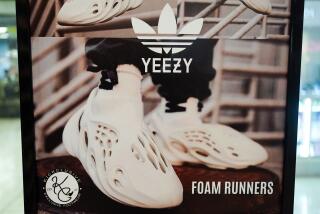Are Pepsi, Madonna on the Rocks?
- Share via
Surely Pepsi knew Madonna wasn’t a virgin.
The provocative religious symbolism of the pop starlet’s “Like a Prayer” video led to a storm of media attention after a small Catholic group protested its showing on Italian TV. But PepsiCo is standing by its $5 million pitchwoman.
According to a Pepsi spokesman, the firm is editing the two-minute ad (which initially ran Grammy night) into 30-and 60-second spots, which will air “when the single is hot and everyone is humming the tune.”
But Pepsi refused to address a long-standing topic of industry debate: Would a corporate sponsor scrub a mega-buck endorsement deal simply because a pop artist’s work--be it song lyrics or video images--provokes a furor? Or inflames religious fundamentalists? Or insults an ethnic minority?
In other words, should pop stars accept millions if they’re obligated to make their art fit corporate-imposed morality or fashion? Madonna’s manager, Freddy DeMann, refused to comment on Pepsi’s agreement--and any “freedom of artistic expression” clauses it might contain.
But industry sources say other Pepsi superstar endorsement deals gave the firm sweeping latitude to torpedo a deal as a result of public furor over an artist’s work or private indiscretions.
According to a contract Pepsi signed with Def Leppard for a Canadian tour sponsorship deal last year: “The sponsor shall have the right to terminate the agreement in the event that any members of (the band) are involved in any publicity deemed to be sufficiently unfavorable in the opinion of the sponsor as to degrade the sponsor’s image or destroy or lessen the value of the artist’s name for the purposes contemplated by this agreement.”
The message is clear: If Pepsi feels a band has somehow given its corporate patron a black eye, the sponsor can choose to bail out.
“That’s the kind of potential horror story that points out the dangers you can have with these kind of corporate deals,” said Geffen Records A&R; exec John Kalodner. “Personally I’ve always been against my bands being involved in any endorsement deals. The art and the music should come first--free from any neccessity of pleasing a corporation.”
Def Leppard manager Cliff Burnstein insists the band’s brief association with Pepsi was trouble-free. “The key question in all this should be--how badly do you need the money?” he said. “For us it was a tiny Canadian deal that we did, in part, just to see how we could handle the notion of being involved with a corporation. Frankly, if you’re worried about the money, then don’t take it. Because if you agree to play ball with them, then you have to play their game--or be able to walk away from it.”
Other top managers also expressed concern that pop stars’ growing involvement with corporate dealmakers opens the door for a potential censorship skirmish.
“When you get art involved with commerce, it becomes very difficult to decide where you draw the line,” said Martin Kirkup, who manages Brian Ferry, Joe Jackson and OMD. “I can’t imagine Freddy would ever allow Pepsi to control what Madonna does. But if you were to ever give up any control over your artist’s work--no matter how many barrel-loads of cash you might get--you’d be doing a real disservice them.”
Where does this leave Madonna? Some industry insiders see the whole Pepsi juggernaut--controversy or not--as a shrewdly conceived media hype. “I’m sure Madonna could use the $5 million, but the Pepsi deal gave her the opportunity to make an event out of her new song,” explained A&M; Records vice president of publicity Wayne Isaak. “Call it amazing or call it weird, but when you’re an artist at Madonna’s level, trying to get to that next career plateau, you almost need something extraordinary like a huge corporate endorsement to get that big media splash.
“At A&M; we don’t do things like give Pepsi a song before you give it to radio or TV. But by letting Pepsi debut the song, it did make the song an event. And in a society so full of information overload, it’s one of the few ways left to guarantee that your event will stand out from all the other events that week.”
More to Read
The biggest entertainment stories
Get our big stories about Hollywood, film, television, music, arts, culture and more right in your inbox as soon as they publish.
You may occasionally receive promotional content from the Los Angeles Times.









